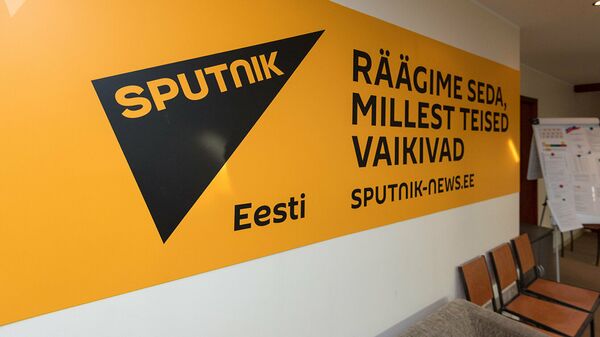Journalists and experts from around the world commented on Estonia’s threats of criminal prosecution against Sputnik employees, condemning the country’s authorities for a blatant violation of the freedom of the press.
According to David Romero Dias, an attorney and political analyst from Spain, many national governments, organizations and corporations seek to monopolize the media sphere, feeling insecure if the multiple alternative sources of information make it difficult for them to control the narrative.
“Freedom of information and the press – is an irremovable part of any national legislation and human right, as declared by the Universal Declaration of Human Rights. We face a violation of these principles, and it requires the closest attention,” he said.
“There is a huge number of alternative information sources and means of delivery, and, as we see, nations and large corporations, including the media, seek to monopolize it, because they understand that information is power that influences entire societies.”
The Iranian head of the state-run Al Vefagh newspaper, Mosayeb Naimi, criticized western media for championing freedom of expression only when that freedom serves its interests.
“[The western countries] disconnect websites that do leaks and reveals from satellites, threaten journalists, deny them entry to Europe and the US, put them on black lists. If freedom of press contradicts Western interests, they wage real war against it,” he said. “It seems like the West supports only the kind of freedom of the press that serves the interests of their own policies; this began not today or yesterday, but has gone on for years now.”
He added that “only obedient journalists” can speak freely in Europe, while others face travel and visa obstructions.
Emad Abshenas, editor-in-chief of the Iran Daily and head of the Free Iranian Journalists Association, commented that Western countries “do not want to hear the voice of reality” and believe they can cap it by introducing information censorship.
“It’s different times now and you cannot silence everyone this way,” he pointed out.
Janusz Niedzwiecki, head of the European Council on Democracy and Human Rights, called Estonia’s actions an “unprecedented act of violation of basic human rights and freedom of expression.”
Niedzwiecki noted that Article 10 of the European Convention on Human Rights guarantees all citizens freedom of opinion, which includes freely receiving and disseminating information without state interference.
“As far as I know, Sputnik journalists did not violate Estonian law, so the threats they received are a shocking attempt to terrorize them as citizens, which violates their rights as journalists,” he said. “Regardless of sympathies and antipathies in [Poland and Russia]’s bilateral relations, Poland must not approve incidents of this kind, because they not only constitute a serious abuse of power but also facilitate an erosion of values that lies in the very center of what Europe is.”
Former Polish Sejm member and activist, Miroslaw Orzechowski, says no one’s official activity should be banned if that activity is connected to a state with heavy political weight.
“The society must have access to any information; there is no violation of law here. No government must adopt initiatives that hampers exchange of opinions,“ he says. “Any European state is obliged to enforce principles of democracy; not to block but facilitate the sharing of information.”
Dragana Tirfkovic, director of Serbia’s Center for Geostrategic Studies, pointed out that Estonia is ranked remarkably high on the Reporters Without Borders list – 11th place in 2019 - and wondered how a country with such a high freedom rating could engage in what she suggests is threat and repression.
“Journalistic reporting cannot be one-sided and it is normal that there are different views,” she said. “With such behavior, Estonia risks being labeled a country that pursues a policy of double standards and does not respect the journalistic profession.”
She noted that today, “Investigative journalism has been seriously questioned precisely by the criteria for selecting ‘acceptable’ views. If a journalist has to write according to political views that are desirable, then there is no talk of any freedom. This calls into question the independence of reporting and the freedom of the media.”
Tirfkovic stressed that “it is necessary to establish the same criteria that will allow journalists to express their views freely, whether they belong to leading Western media companies or others.”




